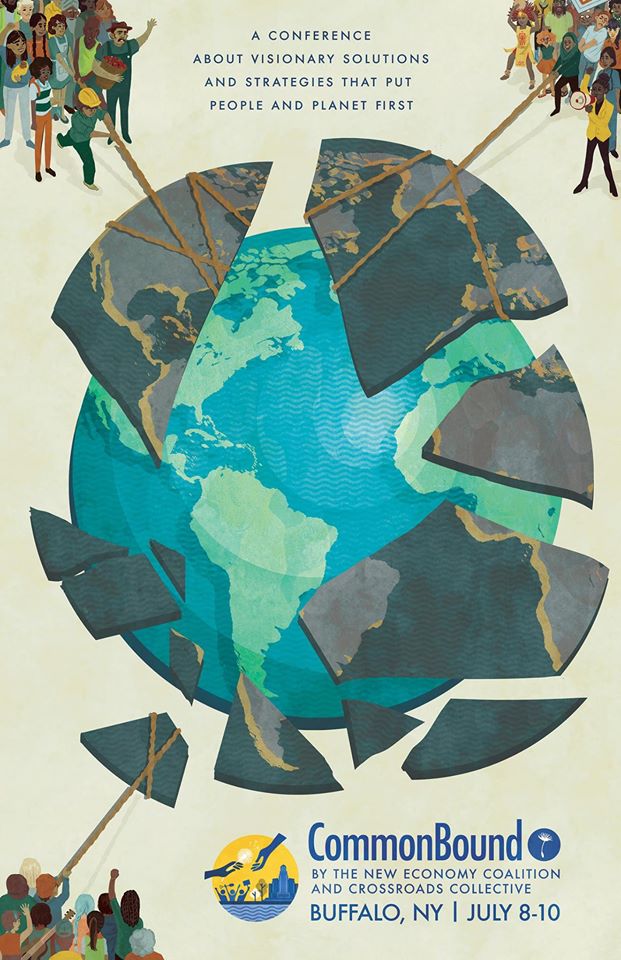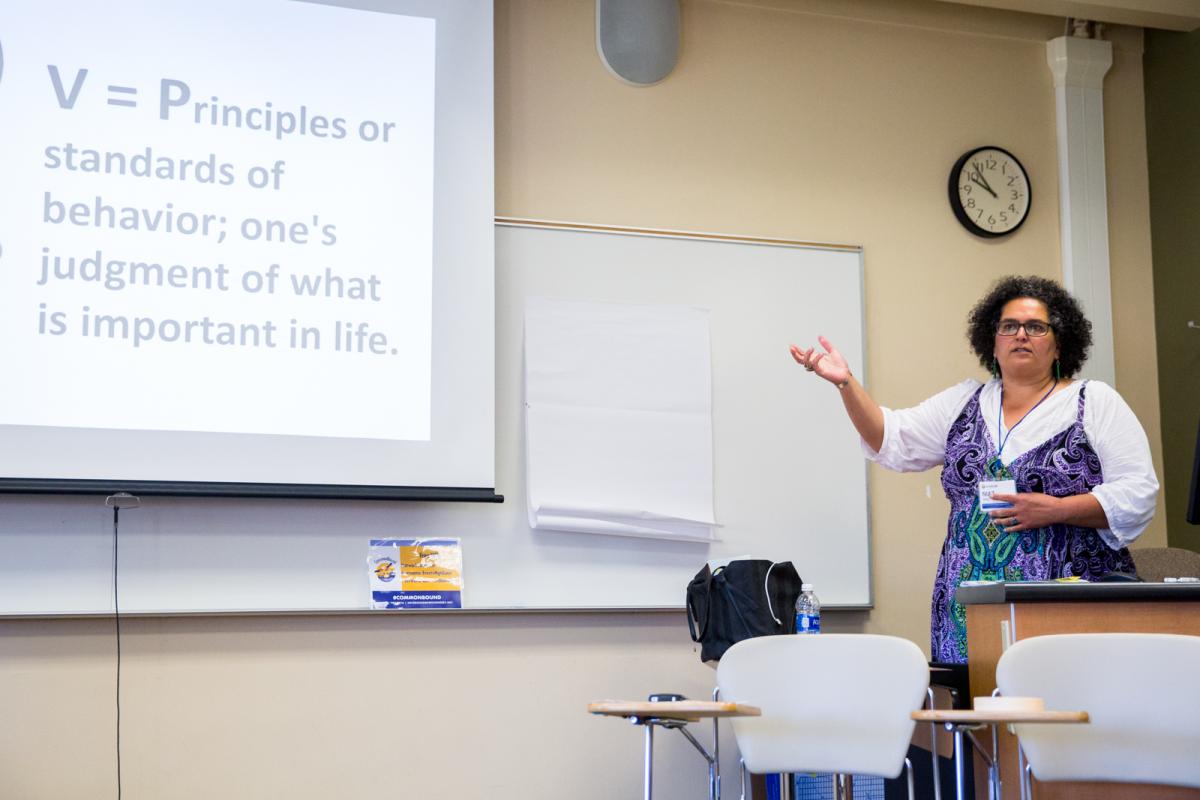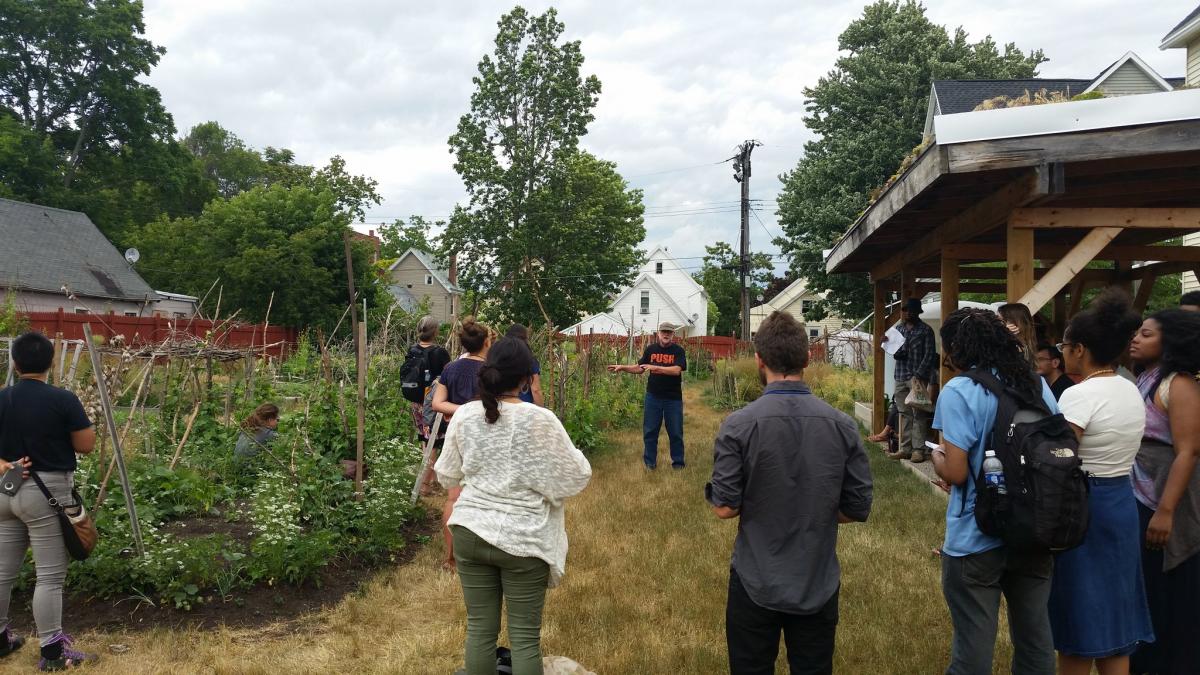
 How do we support community self-determination and sovereignty? It was a question that was posed at the Opening Plenary at CommonBound 2016 in Buffalo, NY. The conference, which ran from July 8-10, explored how we are creating a new economy and how this weaves into the struggles for climate justice, food justice, racial justice, economic justice, and more. This biennial conference started in 2012 and is organized by the New Economy Coalition, a network that brings together a diverse array of organizations and movements around transforming our existing extractive economy into an economy that supports people and the planet.
How do we support community self-determination and sovereignty? It was a question that was posed at the Opening Plenary at CommonBound 2016 in Buffalo, NY. The conference, which ran from July 8-10, explored how we are creating a new economy and how this weaves into the struggles for climate justice, food justice, racial justice, economic justice, and more. This biennial conference started in 2012 and is organized by the New Economy Coalition, a network that brings together a diverse array of organizations and movements around transforming our existing extractive economy into an economy that supports people and the planet.
This year’s conference was focused around sixteen different tracks. Organizers connected with Food Solutions New England, Northwest Atlantic Marine Alliance, Real Food Challenge, and Interaction Institute for Social Change organized a track on “Creating Just, Ecological, and Democratically Controlled Food Economies.” Other conference tracks included Beyond Business as Usual: Community Enterprise and the Sustainable Democratic Future of Business; Beyond Borders: Migrant Justice and Land Sovereignty in the New Economy; and Black Lives, Labor, and Liberation in the New Economy. Each track was organized by volunteers engaged in these movements and brought practitioners, organizers, thinkers, and participants to learn together, strategize, and weave connections amongst our work.

Part of the framing of the “Creating Just, Ecological, and Democratically Controlled Food Economies” track was as follows: “Our current food system is unjust, ecologically unsustainable, and built on the backs of those who grow, raise, catch, and handle our food. The explicit and hidden costs of food injustice are evident throughout our economy; from young families to seniors, schools to healthcare institutions, and workplaces throughout the country. Opportunities to create a more just food economy offer the potential to effect positive lasting change while dismantling the very practices that have led to the pervasive impact of food inequities. We must build a new food economy through innovative ecological businesses that grow racial equity and food justice, and ensure all those along our entire food chain can live healthy lives with integrity.”
The workshops within this track explored this theme in a variety of ways. On Saturday the workshop “Building Power to Transform our Food System” explored on-the-ground work in different communities to create an equitable food system that provides healthy food access, land and sea access, and living wages for food workers. In the workshop, “Building WealthWorks Food Value Chains,” practitioners shared about their work using the WealthWorks model which seeks to build eight forms of capital: intellectual, financial, natural, cultural, built, political, individual, and social. Presenters shared about work in rural Appalachia where organizations and business have collaborated together to strengthen the food value chain and increase access to food, farmland, and food business ownership in their communities.
On Sunday, I helped to organize a workshop on “Growing Cooperation and Equity on Land and Sea,” which brought together different efforts to organize cooperatives. Doug Feeney, from the Chatham (Mass) Harvesters Group, talked about the increasing corporate control of fisheries, and how their community is working together to access new markets as a cooperative, with their particular focus on marking dogfish, an underutilized species. Mohamed Dekow, from Lewiston, Maine, spoke about the Somali Bantu culture’s traditional farming roots and about farming and food projects in Lewiston where the Somali Bantu people are creating new cooperatively structured farms including New Roots Cooperative Farm, Sustainable Livelihoods Relief Organization, and Somali Bantu Community Mutual Assistance Association. I presented about Maine Farm & Sea Cooperative and our bid for the UMaine System Dining Contract and about other cooperatives that are rooting our food system in values of equity, democracy, and local control.
 Food was also featured on one of the community tours of Buffalo. On Saturday’s Tour of the Green Development Zone, we walked around an area of West Buffalo, where community gardens and greenhouses have been started by PUSH Buffalo and the Massachusetts Avenue Project. An affordable house renovated by PUSH Buffalo featured net-zero construction and rain water gardens. These projects demonstrated the power of communities to come together to create projects that provided food and jobs for their community.
Food was also featured on one of the community tours of Buffalo. On Saturday’s Tour of the Green Development Zone, we walked around an area of West Buffalo, where community gardens and greenhouses have been started by PUSH Buffalo and the Massachusetts Avenue Project. An affordable house renovated by PUSH Buffalo featured net-zero construction and rain water gardens. These projects demonstrated the power of communities to come together to create projects that provided food and jobs for their community.
As we grow a regional food system, it is vitally important for us to examine and critique the economic system that has created our industrial food system while working to amplify and grow new economic models that build equity, access, and cooperation in our food system. CommonBound provided a space to connect our food movement to a broader struggle for a new economy. It is my hope that this dialog and connection can become a stronger thread in our regional food movement as we continue to examine how we can weave our communities, our businesses, our farms, fisheries, and all the people who work within the food system together.
For more information on CommonBound go to http://commonbound.org/.
Jonah Fertig is a Cooperative Food Systems Developer with the Cooperative Development Institute in their Cooperative Food Systems Programs. He co-founded Maine Farm & Sea Cooperative, Local Sprouts Cooperative in Portland, the Cooperative Design Lab and more. He is currently focusing on supporting cooperatives in the New American community including New Roots Cooperative Farm and Sustainable Livelihoods Relief in Lewiston. He presents regionally and nationally on growing cooperatives in the food system and co-owns Celebration Tree Farm in Durham, Maine.




